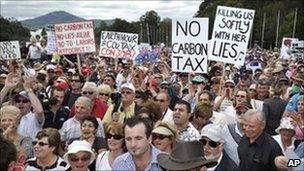Australia carbon tax plans spark protests
- Published

Protesters are angry the prime minister appears to have gone back on an election promise
Rallies have taken place in Australia in protest at plans by the Labor government to bring in a carbon tax.
Hundreds of people have attended demonstrations in the national capital Canberra as well as in Melbourne, Brisbane, Adelaide and Perth.
Critics say without a binding global agreement the proposed levy will cost jobs and erode the competitiveness of Australian businesses.
The government says Australia needs the tax and an emissions trading scheme.
Protesters say they are just ordinary Australian workers and taxpayers who feel betrayed by the government's plans to put a price on carbon.
They insist it would damage the economy and drive up the cost of living by making energy far more expensive.
"There is a groundswell of people that have finally had a gutful," said one demonstrator.
"Since the Labor government has come into this country the union rules. We just cannot do it anymore. We have no more money left to pay the taxes," another protester said.
'Left behind'
The demonstrators have the support of the conservative opposition leader, Tony Abbott.
He says that without a global carbon pricing agreement, Australian businesses would be less competitive.
"A one-sided carbon tax, a unilateral carbon tax is an act of economic self-harm," he said.
Supporters of the tax believe it will cut pollution in Australia, which is one of the world's worst per capita emitters of greenhouses gases.
They say it will also encourage the development of a low carbon economy.
Prime Minister Julia Gillard says that opposition will not derail the plan.
"Now, I understand there is always going to be a variety of views in the community," she said.
"We'll see that on display today but pricing carbon is the right thing for our nation's future and that is why I am determined to do it."
The prime minister hopes to bring in a tax on carbon next year before introducing an emissions trading scheme as early as 2015.
She insists that without these key economic reforms, Australia will be left behind by its international competitors.
- Published20 March 2011